Welcome to the week. It’s going to get busy and interesting this week. Before the silliness starts, below are all the stories you need (from sources you can trust) to get up to speed.
What that cop said: Heinous remarks from a police officer about running over and killing a bicycle rider were actually just sarcasm and there was no harm intended, says the officer in response to outrage over the viral video. (NBC)
Better communications: The Portland Police Bureau has hired a non-sworn, ex-journalist as their public information officer. This should reduce turnover and lead to more thoughtful and professional communications from our police agency. (PPB)
Controversial take on carlessness: Three urban planners share the inconvenient truth that low-income people should receive more subsidies to help them get cars, because their economic mobility depends on it. (Transfers Magazine)
Ban right turns on red: Safety advocates in Denver are hoping the mayor takes their advice and bans right turns on red by drivers citywide. “Banning turns on red was something that the committee identified as something that is very quick and low-cost that the mayor could do immediately to make our streets safer for everybody,” said a local nonprofit leader. (Denver 7)
E-bike rebates work: New research from UC Davis finds that people who took advantage of e-bike rebates use their bikes more and a majority of them said they now replace 1-3 car trips per week with their bike. (National Center for Sustainable Transportation)
ODOT losing freeway fight: ODOT staff told the Oregon Transportation Commission last week that they will scrap plans to add a third lane on I-205 because it’s just not worth the price. (Oregonian)
Honda’s Moto Compacto: This is the type of vehicle we need to see more of from automakers! A tiny, sit-down, two-wheeler that can go 15 mph. (Honda)
Cameras in carland: America’s most car-centric state has passed a bill that would allow use of speed cameras, now all California Governor Gavin Newsom has to do is sign it into law. (Streetsblog CA)
EVs and oil: “E-bikes are displacing twice as much oil as all the world’s electric cars, buses, vans, and trucks combined.” (Anthropocene Magazine)
Seattle’s Davey Oil: Oil was inspired by Portland’s Splendid Cycles and has now built something very special of his own with G & O Family Cyclery. He has also proved that success can come to shops that treat employees like professionals, are inclusive, and stock only utility-minded brands. (Bicycle Retailer)
An American in Spain: Colorado’s Sepp Kuss won the Vuelta and becomes the first American to win a grand tour in 10 years and just the fourth in the history of the sport. (Velo)
Thanks to everyone who shared links this week!



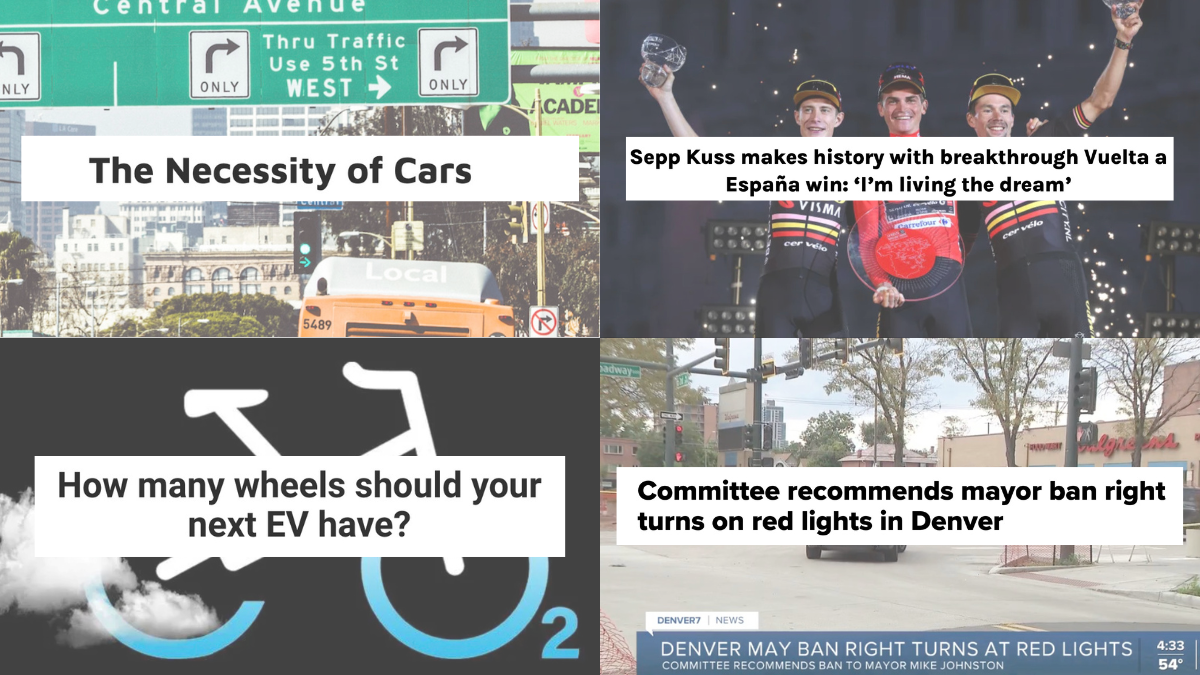
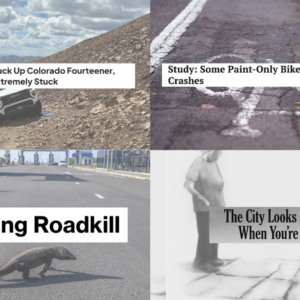
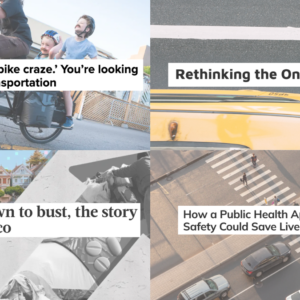
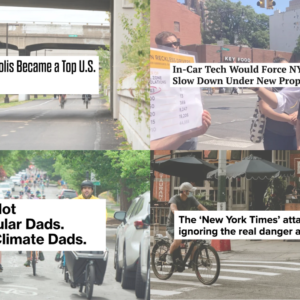
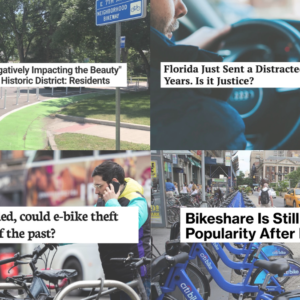
Thanks for reading.
BikePortland has served this community with independent community journalism since 2005. We rely on subscriptions from readers like you to survive. Your financial support is vital in keeping this valuable resource alive and well.
Please subscribe today to strengthen and expand our work.
Who knew the 2-3 wheel electric motorcycles, which are exceedingly common in much of the global south, are the exact same thing as “e-bikes”.
https://about.bnef.com/electric-vehicle-outlook/
Such a beautiful “e-bike”:
All of these vehicles, including the Moto Compacto mentioned above, reinforce my view that vehicle categories are getting more and more blurred, and we are left with a spectrum of transportation options, where conventional bikes are toward one end, large cargo e-bikes towards the center, and cars further down, followed by SUVs and trucks.
moto compacto looks like a Star Wars droid maybe even a Jawa crawler! love it!
It looks like one of those folding tables we use for events, but on wheels.
As someone who believes strongly that we made a mistake in making our society as car-dependent as it is, and that we should move in the opposite direction, I do find myself not entirely disagreeing with the Necessity of Cars article. I said not entirely disagree because I think an even better approach than that of the article is to provide low and middle income housing in transit accessible locations and encouraging low income people to live near convenient transit. However, while that continues not to happen, it seems a bit inhumane to force low income people to be the tip of the spear for our bourgeois transit/climate revolution. Which is not to say that climate change is a concern only for the wealthy, but it is to say that a lot of the arguments (though not all!) I see regarding climate change do not actually take into consideration people of lesser means. That consideration needs to happen. If giving low income individuals a car to help them with upward mobility helps in the moment, then I can’t entirely object to that. Nothing rankles more than people who either have a car or can afford to live in an area where they have great transit access lecturing low income people about the environmental and social costs of driving. I still think a better solution is more affordable housing near transit corridors like Belmont, Hawthorne, Division, and the MAX.
This will never happen in our so-called “free” market because real estate investors successfully created massive self-dealing subsidies via government capture that have juiced urban land prices to the point of making very low-income housing unfeasible without massive government intervention (e.g. price setting/eminent domain and/or rescission of direct/indirect subsidies).
Materials and Labor (about 75% of total project cost) don’t care if the tenant can pay rent comparable to an income at 30% of AMI or full freight market rate. Land has very little to do with project feasibility.
Land value+property value was what I intended.
Developers are the last people who want to see materials and labor cost what they do, so yeah, if you want very low-income housing it has to be subsidized in one way or another.
The callous remarks of the police gang vice president/publicly funded thug Officer Daniel Auderer are somehow not the worst part of this story. The murderer, Officer Kevin Dave, has not only not been charged or even disciplined, he is still out roaming the streets, and he could easily kill again. It’s not surprising that someone high up in the police gang would speak like that, the police usually vote for the absolute worst humans possible to represent their interests. Seattle is no different than Portland in that regard.
Hey, at least he called the murder victim a ‘low value’ person, its got to a step up from the police term ‘No Human Involved‘, her family should be honored.
What is your definition of “murder”, because this is what I’m finding:
mur·der
/ˈmərdər/
noun
noun: murder; plural noun: murders
Going 74 in a 25 is beyond negligence. Murderer Officer Kevin Dave didn’t even react when he ended her life. I think he very well knew what he was doing.
You can mess around with semantics if you’d like, thats what the police gang will do, but this was not an accident, it wasn’t negligence, it was an intentional action that claimed the life of 23-year old student.
Yes, the driving was reckless.
Driving too fast was intentional; striking the student was unintentional and accidental. It certainly wasn’t premeditated.
This isn’t semantics, it’s just what the words actually mean.
When you intentionally misuse words the way you are doing here, you lose all credibility. You can describe the officer as “dangerously reckless” here. You are erasing and discounting the lives lost to actual murder.
Especially the 57 actual murders in Seattle so far this year.
This is one of the many, many reasons why everyone on BikePortland (and everyone for that matter) should be opposed to tolling — or congestion pricing, as some like to call it as a euphemism. No money from tolls means no money for freeway expansions, in addition to the fact that low-income people who can’t live near their jobs or work remote will bear the brunt of the impact from tolling.
Tolls are pretty much the most regressive tax form out there, and basically amount to grabbing money from low-income people and giving it to the rich.
They don’t have to be. I find that this is only ever brought up to nix any idea to make road users pay for the cost of their infrastructure usually by people who are not the poor and disabled that would be negatively impacted by a regressive version of a user fee. Trotting poor people out to cancel any kind of idea that would reduce driving or make it slightly more difficult to drive is a pretty tried and true tactic of monied interests and people who have chosen to become dependent on their car. They do the same for any suggestion of reducing lanes to benefit other modes.
The easy solution to tolling being regressive it to make it progressive by scaling tolls with income. Works just fine for income tax. Works in other countries. We could also do the same with traffic fines. Make $100k your speeding ticket is $1k make $20k it’s $50 and both people get points on their license.
I’m not swayed by your desire to tie punishment to factors not relevant to the crime committed or the danger to others. Unless you are on a long downhill and your brakes fail, everyone has the option not to speed.
Ok. If you think lopsided economic punishments that unnecessarily harm the poor while giving the rich a pass to do whatever they want are fine that’s your prerogative. I also disagree your characterization of the punishment. The point is the punishment is an economic hardship which is necessarily greater for a richer person than a poorer person. If you make a million dollars a year a $250 speeding ticket is nothing to you. If you make $20k that could put you on the street. Why would you be ok with that inequitable system of punishment?
The point of scaling fines with income is specifically to avoid the punishment being tied to those other factors. If two people speed and one is punished by having to cough up some pocket change and the other has to potentially forego some other necessary expenditure like food or water, they haven’t actually been punished equally, regardless of what the numbers say.
It depends on what the punishment is; if it’s intended to be deprivation of a fixed percentage of material wealth, you might have a point. But I don’t think that’s what traffic fines are intended to be. They’re intended to deter bad behavior, and I regard them as completely voluntary.
In the end, everyone has a different ability to bear any given punishment. As a friend of mine told me when he got out of the army told me, “that idiot sergeant never figured out that I actually liked mopping the gym.”
And they are not effective at doing that if they’re not scaled with income. It would be no deterrent for me if fines were $1 for whatever (speeding for example). None at all.
Which is why the fines should be scaled with income. It is extremely straight forward. Your friend’s sergeant was an idiot because he was doing the punishment wrong. We know we’re doing it wrong when the fines don’t scale, so lets not be idiots.
Citation, please.
In addition to the financial penalty, there’s drivers license points and insurance ramifications. So I hope even a $1 fine would deter you.
Currently in order for the police to get your financial information they are required to get a search warrant. I don’t see a judge issuing one for a speeding ticket. This is why trying to use income for speeding tickets or tolling will not work. The first thing you will come back with is that other countries do it. Those countries do not have the laws that we have to protect our privacy.
It would be welcome to see the Pedestrian and Bicycle advisory committees to PBOT issue a joint letter to City Council and the PBOT Director requesting to limit right turns on red and require a timely response (e.g. 45 days’ time) as to why they cannot or will not advance it. Include the high traffic fatalities as a public health matter requiring attention.
We rarely enforce our EXISTING traffic laws in Portland. Maybe we should start with doing that on a regular basis before adding MORE laws that also WON’T be enforced.
Why not both?
If pbot was to advance a proposal to ban turning on red in Portland, I’m sure Mingus mapps and Millicent Williams would turn around and make it legal again using a secret back room decision making process.
The Oregonian link in the ODOT article currently links to https://escholarship.org/uc/item/0bk6b8j1
sorry phil. fixed that. here’s the link https://www.oregonlive.com/commuting/2023/09/odot-nixes-plans-for-third-lane-some-tolling-on-i-205.html
Seppppp Kuuuuussssss!!!
An American in Spain: I can’t seem to get the link to connect. What am I doing wrong?
Regarding The Necessity of Cars, I haven’t had a chance to read past the abstract, but something that’s been been on my mind ever since Car2Go left Portland is whether it would have been worth having a similar business partially or fully subsidized by the government. Having Car2Go available made living car-free much more viable, and potentially cheaper depending on how much you drive.
And while this is obviously just my own experience, I can say that I definitely drive more now that I own a car. It comes down to motivation; adding the inconvenience of having to walk a few blocks to the nearest available car can encourage me to bike or take transit. I don’t know how much a difference that would make for others but I doubt I’m unique in that aspect.
(The other advantage to having more people use car-sharing is that it’s more cost-effective to transition to cleaner cars, since the costs can be distributed among the users.)
You’re in luck! There’s still several car-sharing programs active in Portland, with Free2Move working very much like Car2Go (aside from having much bigger vehicles). Car2Go was mostly about getting rid of unsaleable vehicles rather than providing a service, which is why it disappeared when the original fleet reached some arbitrary age. Not sure about Free2Move.
My experience with car ownership is different. I also have a car, but use it in the city vanishingly rarely. I usually just ride my bike, or, rarely, take the bus.
https://www.portland.gov/transportation/walking-biking-transit-safety/shared-vehicles-bikes-and-scooters-portland
I tried to sign up for Free2Move, but for some reason they’ve never emailed back. Looking at their map I’m just outside their service area, so even if they did it wouldn’t be super practical at the moment.
(F2M’s cars are also huge SUVs. Not a deal-breaker I guess, but I really miss the Smart Fortwos Car2Go started out with. Super easy to park anywhere.)
It should be a deal-breaker.
I used free2move and likely wouldn’t use a similar program that only had tiny smart cars. Why? Because I only use the service when I need to get somewhere outside the city that is not accessible by regular public transit. I also travel with my partner and our infant son. I don’t need an SUV, a sedan would work fine, but a 2 person vehicle wouldn’t. A range of car sizes and offering EVs would be great. The on demand aspect of free2move is its biggest selling point; I can walk 10 minutes and pick up a car vs. going to PDX when I’m trying to drive to hood river.
Maybe the story out of Las Vegas of the former police chief hit from behind and killed by two joyriding teenagers, filming the whole thing and laughing about it will make the cut for next week…not like it wasn’t everywhere on social media this weekend…
I looked that up- horrifying.
Police chief? Well, at least it was a low value human being.
/s
Absolutely horrifying. But since it was a retired officer, we know that he will be tried as an adult and likely sent to prison for 25 to life.
strong towns has a thought provoking podcast about speed cameras. https://www.strongtowns.org/podcasts
The basic argument is that speed cameras keep the status quo car centric design by blaming drivers for driving as fast as road design allows. And, as with tolls, if speed camera revenue becomes significant, it will make it hard to change the streets to designs that don’t need speed cameras because we will be hooked on the revenue and there won’t be an incentive to wean. I don’t agree with everything in that podcast, but I think it’s interesting that accepting speed cameras basically means that we are accepting a car-centric status quo.
Do these second-order effects trump the primary goal of reducing death and injury in the short-term while we figure out better long-term solutions?
And I generally do blame drivers when they go too fast, even if the road doesn’t physically prevent them from doing so. Drivers are responsible for their actions.
Like I said, I don’t agree with everything but I thought it was pretty thought provoking. Additionally, he makes the point that to really reduce risk of death on urban streets, speed limits should probably be 20 mph at max. So a speed camera, like on BHH that tickets drivers going over the speed limit of 35 probably isn’t substantially reducing the risk of a death in case of a crash with a pedestrian. I think you can make the argument that if a street needs a camera to reduce speeds then put the camera in, but at the same time begin to redesign that street to make it less of a race track. The camera on BHH is kind of ridiculous. People know it’s there so they slow down on that one block, then speed up again. It’s hard to imagine that it has made the risk of crashes much less and even harder to imagine it’s made being a pedestrian or a cyclist in that area safer.